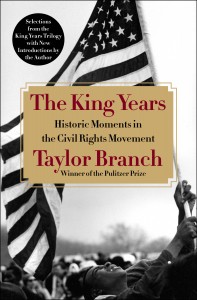JANUARY 2013
Simon & Schuster has announced a publication date of January 8, 2013 for my new book, The King Years: Historic Moments in the Civil Rights Movement. The timing honors a month of epic anniversaries in the unfinished history of freedom in the United States. Consider these three:
1. 150 years ago, in January of 1863, Abraham Lincoln’s Emancipation Proclamation declared forever free nearly 4 million slaves then living under Confederate control. Two years later, as dramatized in the current Steven Spielberg film, Lincoln pushed through the 13th Amendment shortly before his assassination.
2. 50 years ago, in January of 1963, Democratic Governor George Wallace of Alabama delivered his defiant inaugural speech pledging, “segregation now, segregation tomorrow, segregation forever!†One century after the Civil War, Wallace tried and failed to preserve an old order of unequal rights in the midst of a citizens’ upheaval called the modern civil rights movement (1954-68).
3. Now, in January of 2013, a re-elected Barack Obama takes his oath as the first African-American President of the United States. Equal rights and opportunity have advanced broadly, perhaps miraculously in historical context, but racial issues still are muted as solved, unsolvable, or both. Group voting sharply divides the major political parties.
 This compact, 190-page book is a venture for our time of rapid change in communication. Professors and teachers long have complained that while story-telling history is accessible for their students, my multiple thick books are difficult to handle. From another angle, general readers who appreciate narrative have pressed for some distillation of key questions and lessons that have evolved over the thirty-plus years since I began research for Parting the Waters.
This compact, 190-page book is a venture for our time of rapid change in communication. Professors and teachers long have complained that while story-telling history is accessible for their students, my multiple thick books are difficult to handle. From another angle, general readers who appreciate narrative have pressed for some distillation of key questions and lessons that have evolved over the thirty-plus years since I began research for Parting the Waters.
It was hard for me to revisit my work, in part because I believe personal detail is vital in cross-racial history. The goal here is to preserve detail from the original language of my civil rights trilogy, sometimes stitched together between volumes, achieving economy by painful selection among the stories told. There is literary blood on my office floor, but I take responsibility for the choices. Combined with new summary introductions for each chapter, which are necessarily more analytical, I aim to deliver accurate narratives that raise salient questions across the full sweep of the civil rights era.
For more information on the nature and content of The King Years, please consult Simon & Schuster’s full press release. Also, my introduction to the book is available for listening in a sample from the audio edition read by Leslie Odom, Jr. The current January 2013 issue of Atlanta Magazine contains an exchange on my personal background for the book since childhood in Atlanta. Finally, there is a January 5 pre-publication interview with Linda Wertheimer on NPR’s “Weekend Edition.â€
Postings over the next few days will introduce other new projects related to the book. An enhanced digital edition, for instance, offers audio and video links to illustrate material in the text, including news footage, music, and excerpts from presidential recordings. On the educational front, I hope to build on experience as an adjunct teacher of civil rights history at Goucher College and the University of North Carolina. Starting in this spring semester of 2013, the University of Baltimore will offer to a potentially expandable group of on-line students my weekly seminar built around The King Years.
Thankfully, some things endure in the digital age. The civil rights era has kept me enthralled over a long career writing history. It remains an unsurpassed source of learning on our capacity for justice and free government.





